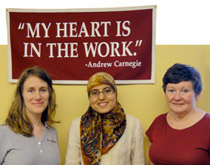Lamia Ben Hiba’s days are full. The software engineer for Morocco’s water utility is also working toward her PhD, studying social network analysis at the National School of Computer Science and Systems Analysis. When she learns about TechWomen—a U.S. State Department exchange program that connects women working in technology in Muslim countries with American counterparts—she jumps at the opportunity, even if it means further juggling her schedule.

She finds out she will spend her time in the States at Carnegie Mellon in Silicon Valley, under the tutelage of faculty members Jeannie Stamberger, the associate director of the Disaster Management Initiative; and Patricia Collins, whose research includes investigation into communication tools for emergency responders.
Ben Hiba will share an office with Collins during her stay. On her first day, small talk quickly evolves into a brainstorming session for a research project. By the next morning, Ben Hiba has a list of ideas, and they choose one. “Off she went!” says Collins.
Their research examines whether Twitter was useful in disseminating information within the first 24 hours of the 2010 San Bruno, Calif., gas explosion that killed eight people. Preliminary results are affirmative. Five weeks later, at the end of TechWomen, all 37 Muslim country participants and their mentors gather at the State Department, where they meet with U.S. Secretary of State Hillary Clinton. Six are selected to present their research, including Ben Hiba. The program culminates, in part, with July 4 fireworks viewed from the State Department balcony, an honor typically reserved for diplomats.
Ben Hiba has returned to Morocco, but she continues to collaborate, via Skype, with Stamberger and Collins; they plan to publish their research in an academic journal.
—Lorelei Laird (DC’01)



